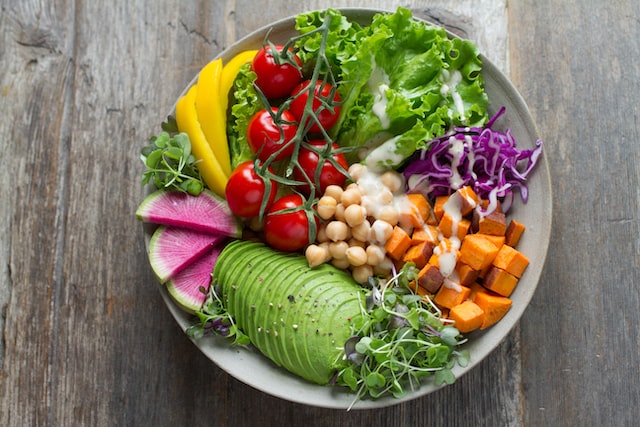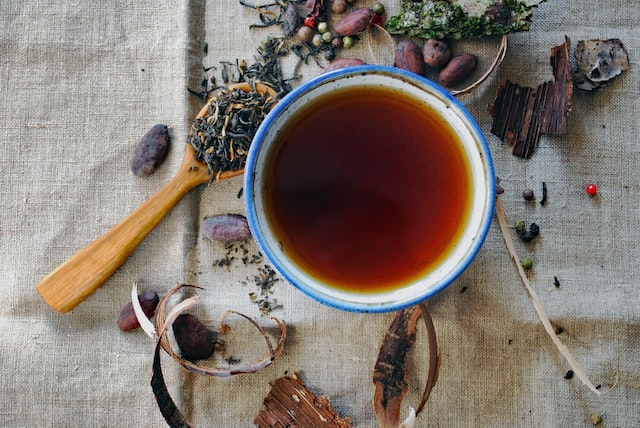It’s hard to emphasize just how much your gut health impacts your daily life. From synthesizing vitamins and breaking down difficult-to-digest food to boosting your immune system and reducing your chances of disease, your gut microbiome is essential.
Improving your gut flora can help you to feel less fatigued throughout the day, boost your immune system, and improve overall digestion, along with many other benefits. Making small changes in the kitchen can help you incorporate healthy habits into your life and create a gut-friendly home.
What causes gut inflammation?
Many common health complaints are the result of inflammation in our bodies. When we eat inflammatory foods, the inflammation centers in our digestive system. What causes inflammation for you might not cause the same reaction in others, but there are some commonalities in inflammatory foods. Some common types of foods that aren’t good for your gut are processed foods, sugar, and alcohol.
Common inflammatory foods to avoid
Below is a list of foods that are considered to create or aggravate gut inflammation. You might find that you’re more sensitive to some foods than others in this list. Everyone’s digestive system has its own quirks, but if you eat foods on this list frequently, one or more might be causing an unhealthy gut microbiome.
- Sugar and high-fructose corn syrup – Processed sugars can be very tough on your gut biome. By feeding certain bacteria, more beneficial bacteria can be reduced.
- Artificial trans fats – Trans fats are notoriously bad for your health, causing heightened cholesterol and inflammation throughout the body.
- Vegetable and seed oils – Some vegetable oils are high in Omega-6 fatty acids, which are not good for inflammation. On the other hand, their close relatives, omega-3 fatty acids, are beneficial for inflammation and overall health.
- Refined carbohydrates – Refined carbohydrates, like those found in white bread and processed snack foods, easily break down into sugar. They create a similar condition in your body to eating sugar and high-fructose corn syrup.
- Excessive alcohol – Over-consuming alcohol has many negative impacts, such as interfering with your gut microbiome.
- Processed meat – Processed meat is frequently high in saturated fat, which causes inflammation throughout your body.
What is an anti-inflammatory diet?
Eating an anti-inflammatory diet doesn’t mean dramatically cutting out certain food groups. You can reduce inflammation by increasing your consumption of gut-friendly ingredients, like fermented foods.
Even if you don’t change anything else in your diet, increasing the number of fermented foods you eat, like kombucha, sauerkraut, and fermented pickles, will help to balance your gut microbiome.
Best diets for improving gut health
If you’re looking for more structure in terms of a diet to reduce inflammation, consider one of the three below. They’re listed from most to least restrictive, so it’s up to you to decide what will suit you the best – or try all three and record your results.
- Ayurvedic diet – Based on eating to balance your body’s energies, this ancient diet plan is based on Ayurvedic medicine. It suggests that you can balance your internal systems and mind by eating based on one of three body types. Each type has a different variation. However, red meat, artificial sweeteners or sugar, and alcohol are off-limits in all three. The Ayurvedic method is widely considered one of the best diets for gut health.
- Plant-based / vegan diet – Like the Ayurvedic diet, a vegan or plant-based diet encourages eating more whole grains and less processed food. Many processed foods are culprits for causing inflammation, so moving to a plant-based diet naturally eliminates many of these options. Having a vegan kitchen can also help with creating an allergy-friendly home since it naturally reduces the presence of allergens like dairy and poultry.
- Mediterranean diet – This diet is famed for happy tummies and glowing skin. Mediterranean foods are typically high in healthy fats, vitamins, and fiber. There is little to no red meat and far fewer processed foods than are typically consumed in the US. Switching to a Mediterranean diet is a great way to naturally improve your gut health. If it helps, frame it as getting to eat more delicious foods from countries like Italy and Greece instead of focusing on restricting or eliminating processed foods.

Stock your pantry with foods that fight inflammation and promote gut health
If you, like most of us, have caught yourself eating something “just because it’s there,” you’ll understand why it’s important to stock your kitchen with healthy choices. Taking away the option to slide back into old habits means you’ll eat anti-inflammatory foods by default when you’re cruising for snacks or an easy dinner.
Fermented foods
Fermented foods are high in naturally-occurring probiotics. Eating these foods regularly is a great way to keep your gut healthy and happy:
- Kefir – Kefir is similar to Greek-style yogurt but tends to be thinner and more drinkable. Similar in protein content, kefir is a convenient option to keep in your fridge for a snack on the go.
- Kombucha – Kombucha is made from fermented tea, generally flavored with fruit or spices. It tends to have a distinctive, vinegary flavor which some people love but is an acquired taste for others.
- Tepache – Tepache has its origins in Mexico, where pineapples are plentiful. Once the skin of a pineapple has been peeled down to the delicious fruit, the peels are saved to make tepache. Pineapple skins go into a jar with brown sugar and sometimes spices like cinnamon, and the mixture is left to ferment naturally. Tepache has a similar taste to kombucha but is milder.
- Tempeh – Tempeh is a common plant-based protein native to Indonesia but is easily found in natural food markets in the US. It’s made from fermented soybeans that are pressed together to form a shape. While this sounds similar to tofu, tempeh has a nuttier, stronger flavor than tofu, which is blended soybeans poured into a mold to give it shape.
- Miso – Miso is a Japanese seasoning paste made by fermenting soybeans. Miso adds a beautiful, warm umami flavor to soups, salad dressings, and even pasta sauces. The trick to getting the probiotic benefits from miso paste is to be sure not to overcook it. When cooking soups and sauces, it should be added at the end to ensure you’re not losing some of the benefits.
- Natto – Natto is a much-loved Japanese dish, often served as breakfast food. Natto is made from fermented whole soybeans, creating a probiotic all-star of a dish. Many fermented culinary seasonings and dishes are made from soybeans, as they’re a common crop in certain areas.
Pickled foods
Pickled foods are a gift to your gut. They contain Lactobacillus bacteria, which are commonly seen in probiotic pills. Not all bacteria are bad, and Lactobacillus is wonderful for your digestive system. Below are some commonly available pickled foods containing plenty of this gut-friendly bacteria:
- Sauerkraut – Made from fermented shredded cabbage, sauerkraut is a staple ingredient on many tables. Originating in eastern Europe, sauerkraut packs a powerful probiotic punch, but there’s a catch. Probiotics are living bacteria, and the pasteurization process that many mass-produced food items go through means they’re heated to a point that most of the beneficial probiotics are destroyed. If you’re eating sauerkraut for the digestive benefits, make sure you’re buying raw, unpasteurized brands.
- Kimchi – Kimchi is similar to sauerkraut in many ways but includes more ingredients and spices. Recipes for kimchi are more varied than sauerkraut and can often include other veggies, like bok choy, carrots, and onion. The process that mass-produced kimchi goes through is the same as sauerkraut, so keep an eye out for unpasteurized kimchi to cash in on the probiotic benefits.
- Pickles – Pickles are a common sight on many American grocery store shelves. If you’re looking for pickles that aid in gut health and have anti-inflammatory properties, it’s the refrigerator section you’ll need to hit up. Pickled foods with probiotics are not pasteurized, which means they’ll need to be kept in the refrigerator. If a pickled product is shelf-stable, it probably doesn’t have the active probiotics that you’re looking for.
Herbs & spices
Herbs and spices have been a way of adding flavor, as natural remedies for common ailments, and for introducing health benefits to our daily meals for centuries. By leaning more towards dried and processed foods, we lose much of the benefit to our digestive systems that fresh herbs provide. Some of the herbs and spices on the list below still pack a healthy punch when they’re dried, but overall, it’s best to consume fresh food whenever you can:
- Turmeric – Turmeric has numerous potential health benefits in both its fresh and dried forms. When you use it fresh, turmeric looks similar to ginger, only smaller and more orange in appearance. When turmeric is powdered, it takes on a vibrant yellow hue. While this spice is powerful for reducing inflammation, use gloves when cooking with it to avoid staining your hands and clothing.
- Ginger – Ginger is renowned for its digestive benefits, and reducing inflammation is chief among them. Fresh ginger can be juiced or added to tea, and it stores well in the freezer or fridge.
- Cardamom – This powerful and flavorful spice has long been used for its anti-inflammatory benefits. A popular ingredient in chai tea, cardamom can be used both fresh and dried.
- Peppermint – if you’re looking for an easy way to boost your gut health, throw a peppermint tea bag in your water bottle. Cold or hot, peppermint tea is excellent for your gut health. Not to mention it will encourage you to drink more water, which is also key for a happy gut.
- Fennel – Fennel seeds are commonly used as a spice, but the vegetable makes a great addition to salads or just as a snack on its own. Fennel looks similar to celery but with a more bulbous end. It has a light black licorice flavor and will appeal highly to some, but it might not be everyone’s cup of tea. Dried fennel seeds can be kept with the rest of your spice rack, but fresh fennel should be stored in your fridge.

Incorporating anti-inflammatory foods into your kitchen is an easy way to make your gut happier. If you’re struggling with severe digestive issues, switching to one of the diets mentioned above may be the right choice for you. Making conscious choices like shifting to non-pasteurized pickled products and eating less processed foods can significantly affect how you feel overall. Whole grains, fresh produce, and unpasteurized fermented foods are a great step towards making your kitchen a gut-friendly oasis.




